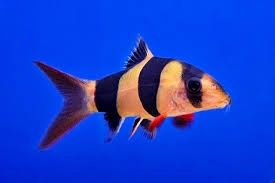Clown Loach (4-6cm)
Clown Loach (Chromobotia macracanthus) Care Guide
The Clown Loach is one of the most popular and charismatic freshwater fish, famous for its bright orange and black striped body, playful behavior, and social nature. Known for their fun personalities and active swimming, they make a delightful addition to large community tanks.
Tank Requirements
-
Minimum Tank Size: 250 litres (adults grow up to 30 cm)
-
Temperature: 24–30°C
-
pH: 6.0–7.5
-
GH: 5–12
-
KH: 3–8
-
TDS: 150–300 ppm
They need stable, clean water and plenty of room to swim and explore. Strong filtration and regular water changes are essential due to their size and activity level.
Habitat Setup
Recreate their natural riverine environment with:
-
Soft substrate such as sand (to protect their barbels)
-
Rocks, caves, and driftwood for hiding and resting
-
Moderate to dense planting along tank edges
-
Open swimming areas in the middle of the tank
They are nocturnal and shy, so providing dim lighting or shaded areas reduces stress.
️ Feeding
Clown Loaches are omnivorous bottom dwellers:
-
Sinking pellets or wafers
-
Live or frozen foods: bloodworms, blackworms, brine shrimp
-
Blanched vegetables: zucchini, cucumber, spinach
Feed multiple small portions daily. They are active foragers, especially in the evening.
Tank Mates
Clown Loaches are highly social and should be kept in groups of at least 5–6. Alone, they can become stressed or shy.
Ideal companions:
Peaceful tetras, Rasboras, Corydoras, larger peaceful barbs, and dwarf cichlids.
Avoid aggressive or fin-nipping fish.
⚠️ Behavioral Note: In small groups, Clown Loaches can become stressed, hide constantly, or show signs of aggression toward other bottom-dwelling fish. In proper groups, they display playful interactions and maintain a peaceful dynamic within their school.
Breeding
Breeding in home aquariums is rare and difficult. Most Clown Loaches in the hobby are captive-bred in specialized facilities.
Interesting Fact
Clown Loaches have clicking sounds they make by rubbing their pharyngeal teeth — a form of communication among each other. These sounds are especially common when they are excited or hunting together!
Reference: Bubbly Fish – Creating underwater wonders

